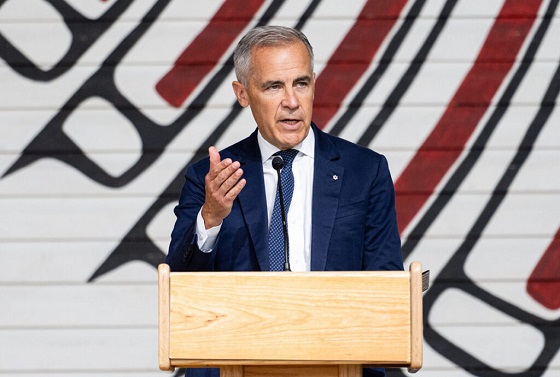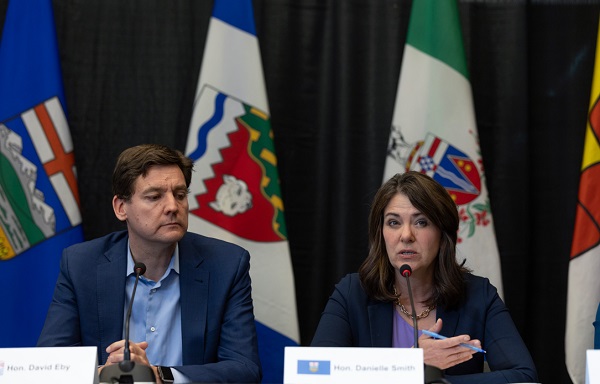National
Conservative candidate says he’s been booted for opposition to mandated vaccinations and vaccine passports

Jonas J. Smith Disallowed as Conservative Party of Canada Candidate for the Yukon
Alberta
Mark Carney Has Failed to Make Use of the Powerful Tools at His Disposal to Get Oil Pipelines Built

From Energy Now
By Jim Warren
It can be refreshing when politicians clearly and unequivocally state their positions on important public issues. That’s what former BC premier, John Horgan, did during the 2017 BC provincial election campaign.
Horgan forthrightly announced he would use “every tool in the tool box” to stop the Trans Mountain pipeline expansion (TMX). For the next three years, Horgan stayed true to his word. Enthusiasm for the fight waned somewhat in July of 2020 when the Supreme Court foreclosed on any further delays over things like a lack of consultations with First Nations.
Of course, how one feels about frank and honest statements by politicians can depend on who is losing out. It can be less refreshing when every tool available is being employed in service of a measure you oppose. But, you at least have a better idea about what you are up against when your opponent clearly spells out where he stands.
The tool box has not been used much in support of pipelines
At this point in Mark Carney’s first year as prime minister it’s become rather obvious, he rarely employs any of the tools at his disposal in support of new oil pipelines. One might reasonably conclude that the opposite is the case—the vast powers of the Prime Minister’s Office (PMO) and the Government of Canada have been employed in opposition to any new oil pipelines to any Canadian coast.
The Liberal government has tried and failed to sell supporters of the oil industry on the idea that Bill-C5, The Building Canada Act, has paved the way for a new pipeline to Canadian tidewater. The prime minister knows Bill C-5 won’t do that.
Ninety some CEOs from Canada’s oil and pipeline sector have informed the PM that Bill C-5 by itself will do nothing to get a pipeline to any coast. They have sent letters saying this to Carney on three separate occasions since he became prime minister. One point repeatedly stressed by the CEOs as well as the Government of Alberta is that it is not possible to build a pipeline from Alberta to the West coast without the repeal of, or significant amendments to, the West Coast Tanker Ban, Bill C-48, and the Impact Assessment Act, formerly Bill C-69 (aka the No More Pipelines Bill).
Carney’s failure to address those concerns defies logic and common sense. The approval and completion of an oil pipeline from Alberta to Prince Rupert under Bill C-5, is in direct conflict with the tanker ban and would face virtually the same insurmountable barriers the Impact Assessment Act presented for previously cancelled pipeline projects. It is not logically possible for all three things to be true at the same time (i.e. Bills C-48 and C-69 remain in place and a pipeline to Prince Rupert is completed)
What possible harm could arise if the prime minister simply stated something to the effect that the boundaries of the region where oil tankers are banned under C-48 will be adjusted to accommodate pipeline projects approved under Bill C-5? You wouldn’t think saying so would remove any hide from Carney’s butt and would provide greater assurance to prospective pipeline proponents.
Wrong.
Carney will not say anything of the sort. That’s because he is more concerned about staying on the good side of the environmental activists who are among his most fervent supporters. The environmental groups leading the crusade against climate change, climate alarmed members of Carney’s caucus, and cabinet would just as soon see the tanker ban remain in place. They want Bill C-48 to serve as a trip wire to thwart projects like a revived Northern Gateway project. They would similarly balk at any tinkering with the Impact Assessment Act which might facilitate the approval and completion of such a pipeline.
Follow the money
Just follow the money. Here’s one of the many pieces of evidence we might consider. Mark Carney has been shoring up his support among anti-oil environmentalists with government cash. Among the un-budgeted expenditures announced by the government in early 2025 was the $206 million to be spent over the next five years under the auspices of the Climate Action Awareness Fund (CAAF). The funds will be used to combat the declining urgency among Canadians for combating climate change. The initial tranche of $14.4 million issued so far this year will be available to help young Canadians address climate change. It appears the principal delivery agents for CAAF funded projects will be environmental organizations, including those groups who were active in the infamous anti-Alberta oil campaigns.
In other words anti-oil environmental groups stand to be among the beneficiaries of $41.2 million per year in government largesse. This level of support is far more generous than the roughly $16.5 million, per year, Alberta’s Allan Commission reported Justin Trudeau’s government had been lavishing on anti-oil environmental groups.
No doubt the Liberals will claim the millions in CAAF funding is a wise investment as opposed to what it really is—an expensive perk for the government’s green supporters. It makes sense to expect the efforts of some of the groups being funded will be devoted to handcuffing the oil industry.
The tool box is actually wide open. It’s just not being used in support of increasing Canadian oil production, exports and revenues.
The tool box is far from empty
The bully pulpit available to the prime minister’s office (PMO) may indeed be far less influential than the one available to a US president. Nevertheless, a clear and unequivocal statement by the nation’s prime minister in support of building a new pipeline to the coast, under reasonable approval requirements, would go a long way toward encouraging potential proponents and reducing public angst and anger in the oil producing provinces.
Canada’s prime ministers have near Trumpian powers at their disposal should they choose to use them. The Justin Trudeau Liberals used the heavy hand of the Emergencies Act to stifle horn honking in Ottawa. Sure, the courts said using the Act in that instance was an overreach on the part of the government, but nobody in government was penalized for imposing it.
If the Emergencies Act isn’t enough to bulldoze a pipeline through to the coast the government can dust off the “peace, order and good government,” powers assigned to Ottawa under Section 91 of the Constitution. And let’s not forget the notwithstanding clause—available to stifle spurious lawsuits claiming that a pipeline is offending someone’s rights.
Admittedly, making use of those two options sounds pretty silly. However, it was Carney himself who suggested he was prepared to do something along these lines on one of the two or three occasions when he slipped up and gave people the impression he would back a pipeline. When campaigning in Kelowna last winter the prime minister said he would use all the powers available to the federal government to get one built. Since then he has backtracked, given Quebec a veto over pipelines to the East coast, and indicated any effort to get a new pipeline approved would require a national consensus and be subject to legislation and regulatory checks that would be extremely difficult if not impossible to meet.
Mark Carney is no John Horgan
Clearly, Mark Carney is no John Horgan. Our prime minister continues to dissemble, obfuscate and change the subject when it comes to getting behind a pipeline that would represent the most economically significant, nation building project capable of producing huge revenues within a relatively short period of time.
The recent federal budget did little to increase the possibility of getting a new export pipeline anytime soon. The conventional energy sector has been facing government barriers to growth in investments, production and exports for over a decade now. It is true the budget announced the elimination of one of those growth killing measures, the emissions cap. And the Liberals deigned to return free speech to those who support oil and gas. Saying something positive about conventional energy firms’ efforts on behalf of environmental sustainability will cease to be deemed illegal greenwashing. However, those positive changes still leave several other equally harmful policies in place.
The budget anticipates a huge increase in private sector investment in response to a package of uninspiring policy tweaks and sugar-coated forecasts. There is little, if anything, in the budget to justify its excessively optimistic predictions. On the other hand, the budget announced that carbon capture projects will not count toward emissions reduction credits if the CO2 will be used for enhanced oil recovery. This will be a bane to CO2 capture efforts in the oil sands and potentially gives the federal government another reason to stifle growth in production and exports.
The flight of investment during the Liberal years owes much to the lack of confidence generated by policies like Bills C-48 and C-69. Doing something to limit the investment killing effects of those two pieces of legislation would cost relatively little, generate billions in oil export revenue, and help restore investor confidence.
If Carney has actually decided there will be no new oil pipeline to the West coast, at some point in the near future that reality will catch up with him. Remaining elusive about pipelines today may help the Liberals should there be a snap election. But, it will do little to advance national unity and is likely to boost the independence vote in Alberta’s referendum.
Here we go again. On Friday November 7 the prime minister told attendees at Canadian Club event in Toronto not to worry the long sought pipeline “was going to happen.”
Pardon me if I’m not convinced. Over the previous three months the liberals clearly acted as though becoming an energy super power could happen without increasing oil production and exports.
Energy
For the sake of Confederation, will we be open-minded about pipelines?

From Resource Works
Can we learn to work together and build together?
The Western provinces now stand on the precipice of achieving the status they have craved since joining Confederation. However, let’s be clear: this is about oil and gas, not just oil, not just gas.
Objectively, the West is the leading edge in Canada’s pursuit of 21st-century prosperity. Will the Western provinces get their act together, or, more to the point, will the premiers and the Prime Minister find a way to do what Canada needs them to do?
The political and cultural differences between Alberta and British Columbia date back to before they entered Confederation.
The Colony of British Columbia was a classic creation of the British Empire. The familiar British structures and institutions of governance were in place, just as they were in central and eastern Canada before Confederation. Settlers to British colonies were typically recruited with secure employment. They were usually employees of an industry, working in administration, logistics, or some aspect of commerce. It is fair to say they were not particularly adventurous, beyond the fact that they had travelled all the way to the West Coast of North America.
Before and after Confederation, many Americans moved into the prairie provinces, where British institutions were not yet well-established. Albertans are often seen, not without reason, as the most “American” of Canadians, a perception rooted in the wave of settlers who brought a frontier culture and economy north from the Great Plains. All of which becomes clear when one surveys the range of historical accounts available through a Google search.
The conflict between the staid British heritage of the Colony of British Columbia and Upper Canada, and the restless energy of the American Wild West, has always been in the background of Alberta’s relationships within Canada.
B.C. and Alberta’s conflicts over pipelines do not originate with oil; they are more like siblings in a never-ending quarrel over anything and everything. That does not mean there is no substance to the pipeline dispute, it means it requires a grown-up response.
Because if we did not think things could get more complicated, they have.
Venezuela, with the world’s largest reserves of heavy oil, is now a clear target of the United States. With the U.S. Navy positioned in the Caribbean Sea, clearly surrounding Venezuela, it is no joke and a clear threat to Canada’s oil and gas industry.
It appears evident that the American end goal is unchallenged access to Venezuelan oil. The strategy resembles a return to the centuries-old model of Empire and Vassal States. The tactical move is regime change.
The United States has only 35.2 billion barrels of oil reserves, while Venezuela, ranked first, holds 300 billion barrels, and Canada, ranked third in the world, has 170.9 billion barrels. For the United States to maintain its global oil status, it will increasingly need large quantities from Canada, Venezuela, or Mexico. (It should be noted that Mexican oil production has declined in recent years.)
Should America’s domination of Venezuela come to fruition, what does this put in front of Canada, for our economic security and sovereignty? It raises difficult questions:
• Can we be sure of maintaining access to the U.S. market?
• Would we be limited to the current capacity of the Midwest refineries, as Gulf refineries expand their heavy-oil processing capabilities?
• Can we be certain that the discount we now experience will not grow even larger?
We must be honest with ourselves. Every day brings new evidence that Canada’s oil and gas future points toward the Asia Pacific region, strengthening the case for an open mind about a new pipeline to the Pacific Coast.
The 6.5-billion-person underserved market is far more attractive, as is a market where buyers are focused on their own countries and their own people, with no intent or interest in punishing their suppliers.
For the next half-century, oil and gas will continue to be the dominant global trade currency. This does not mean we should ignore emissions or fail to protect our coastlines, it implies that neglecting the oil and gas bounty we are blessed with would betray our grandchildren.
To protect Canadian sovereignty, we must significantly expand our oil and gas production and shipping capacity to the Asia Pacific region.
Thirty years ago, no one was predicting anything close to what is happening today.
One thing that has not changed is the United States itself. Since its formation, its leaders have been both expansionist and isolationist. Preferential access to resources and Fortress America are today’s manifestations of U.S. foreign and economic policy.
We should not believe this is just Trump. There is broad public support across America. Polls indicate that while many dislike his tactics, they are also no longer accepting of the Free World relying solely on the United States. They also show growing support for a more nationalist economy, a sentiment increasingly visible across most Western democracies, including Canada.
Future American leaders may not be so Trumpian, but it would be wrong to think the Fortress America approach will be abandoned as Trump leaves office.
Prime Minister Carney needs to lead a discussion that finds a path forward and addresses long-held prejudices founded on differing entry points into Confederation.
Jim Rushton is a 46-year veteran of BC’s resource and transportation sectors, with experience in union representation, economic development, and terminal management.
-

 armed forces24 hours ago
armed forces24 hours agoIt’s time for Canada to remember, the heroes of Kapyong
-

 Digital ID20 hours ago
Digital ID20 hours agoCanada moves forward with digital identification for federal benefits seekers
-

 Daily Caller15 hours ago
Daily Caller15 hours agoLaura Ingraham Presses Trump On Allowing Flood Of Chinese Students Into US
-

 Opinion1 day ago
Opinion1 day agoThe Germans called her the ‘White Mouse’ for her elusiveness
-

 Alberta20 hours ago
Alberta20 hours agoSchool defunding petition in Alberta is a warning to parents
-

 Daily Caller16 hours ago
Daily Caller16 hours agoUS Nuclear Bomber Fleet Shares Fence With Trailer Park Linked To Chinese Intel-Tied Fraudster
-

 Agriculture1 day ago
Agriculture1 day agoBovaer Backlash Update: Danish Farmers Get Green Light to Opt Out as UK Arla Trial Abruptly Ends!
-

 espionage15 hours ago
espionage15 hours agoChinese-Owned Trailer Park Beside U.S. Stealth Bomber Base Linked to Alleged Vancouver Repression Case







